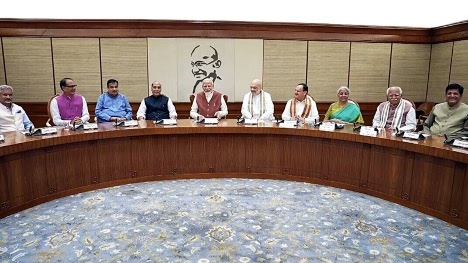Six former chief ministers make up Prime Minister Narendra Modi’s new Council of Ministers, and they all bring a lot of administrative expertise to the national arena. This calculated addition highlights Modi’s strategy of utilizing seasoned leadership in crucial domains of government.
Crucial Nominations for Former Chief Ministers
Shivraj Singh Chouhan: The Union Ministry of Agriculture has been given to the former Madhya Pradesh chief minister. Chouhan is well-positioned to handle national agriculture policy and difficulties because of his vast expertise in state-level administration, especially in an agrarian state like Madhya Pradesh.
Manohar Lal Khattar: Currently serving as the Haryana Chief Minister, Khattar will be in charge of the Ministry of Power and Urban Affairs. His contribution is essential to the energy and urban development policies that are driving India’s infrastructural boom.
Jitan Ram Manjhi: The president of the Union Ministry of Micro, Small, and Medium Enterprises (MSME) is the former chief minister of Bihar and the head of the Hindustani Awam Morcha (HAM). Especially in rural and semi-urban regions, this industry is essential for economic growth and the generation of jobs.
Other Prominent Former Chief Ministers in the Government
Rajnath Singh: The former Uttar Pradesh chief minister continues to serve as the defense minister. India’s defense plans are guaranteed stability and continuity thanks to Singh’s ongoing leadership in this capacity.
Sarbananda Sonowal: Previously the Assam Chief Minister, Sonowal’s position in the Union Cabinet is yet unknown. His prior experience as a state leader gives the federal government a profound grasp of regional dynamics.
HD Kumaraswamy: The former Karnataka Chief Minister is another noteworthy addition. Although his portfolio specifics are still pending, his involvement brings a level of seasoned governance from a significant southern state.
Strategic Repercussions
The deliberate decision to combine expertise and administrative know-how is highlighted by the appointment of these former chief ministers to Modi’s 3.0 cabinet. With a track record of success in their own states, these leaders should improve the efficacy of the Union ministries they currently oversee.
Industry-specific Knowledge
Agriculture: Under Shivraj Singh Chouhan’s leadership, the Ministry of Agriculture is anticipated to concentrate on farmer welfare initiatives, sustainable agricultural practices, and cutting-edge farming methods. Chouhan’s tenure in Madhya Pradesh, a state notable for its agricultural production, will play a pivotal role in molding national policy.
electricity and Urban Affairs: As India pursues its goal of a dependable electricity supply throughout its regions and continues its urbanization push, Manohar Lal Khattar’s leadership in this ministry is essential. His time in Haryana, which is renowned for its quick industrial and urban development, fits well with the objectives of the ministry.
MSME: Jitan Ram Manjhi’s appointment to the MSME ministry is anticipated to stimulate entrepreneurship and small company growth. It is probable that he would prioritize improving MSMEs’ support networks, encouraging entrepreneurship in rural areas, and guaranteeing equitable economic development.
In summary
The thoughtful distribution of important ministries among these seasoned leaders suggests that Modi’s cabinet would combine innovation and continuity. The administration hopes to advance India’s development goal by efficiently addressing both national and regional concerns by using the knowledge of past chief ministers. These leaders’ established track records and administrative prowess position them to be major assets to their respective sectors as they move from state to central control.











